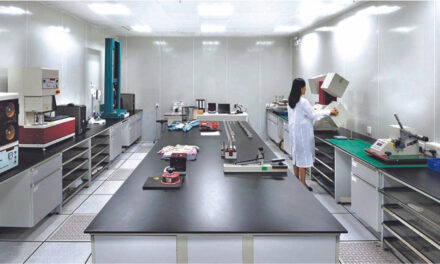 Industry 4.0, often known as the Fourth Industrial Revolution, is the current trend in industrial technology for automation and data interchange. In 2011, the term was coined in Germany and has since spread throughout the world. The Fourth Industrial Revolution is a new stage in the growth of industry, distinguished by the integration of digital, physical, and biological systems.
Industry 4.0, often known as the Fourth Industrial Revolution, is the current trend in industrial technology for automation and data interchange. In 2011, the term was coined in Germany and has since spread throughout the world. The Fourth Industrial Revolution is a new stage in the growth of industry, distinguished by the integration of digital, physical, and biological systems.
Manufacturing has the potential to be transformed by Industry 4.0, making it more efficient, productive, and cost-effective. Companies may optimise their operations and eliminate waste by leveraging data and automation, resulting in better profitability. Industry 4.0 also allows for the creation of new business models, such as mass customisation, in which items can be adapted to particular consumer requirements.
The world today faces two significant challenges: the need to transition to a more sustainable economy, and the need to adopt Industry 4.0 technologies to remain competitive in the global market. In this context, biobased chemicals present a unique opportunity to address both of these challenges simultaneously. Biobased chemicals are derived from renewable biomass sources, such as plant material or waste streams from agriculture, forestry, or food processing industries, which means they have a lower carbon footprint than traditional petrochemicals. Chemists working in the biobased industry are addressing environmentally and socioeconomically unsustainable dependence on petroleum which remains the key feedstock for a wide array of products. Biofuels are a major focus of the biobased industry, but the sector is expanding. Researchers and firms now also emphasize and commercialize bio-derived replacements for basic chemicals on which nearly every industry depends.
Developing chemical feedstocks from renewable sources and using catalytic chemistry to create high-value chemicals that replace petrochemical products is critical to achieving sustainability. Recent findings show that environmental concerns regarding dangerous chemicals and fossil fuel depletion are leading to increased production of biobased chemicals. The market for these chemicals is expected to grow from $6,474 million in 2016 to $23,976 million by 2025.
Furthermore, the production of biobased chemicals can be made more efficient and sustainable by leveraging Industry 4.0 technologies. In this article, we explore how biobased chemicals and Industry 4.0 can be combined to drive innovation and sustainability in the chemical industry.
Industry 4.0 has emerged as a significant tool in recent years as a means of enhancing manufacturing processes with bio-based materials. Mentioning some of the applications of Industry 4.0 that can be found in the production of bio-based products.
Precision agriculture
The requirement for a reliable supply of biomass feedstocks of a high quality is one of the most critical issues faced in the production of bio-based products. Precision agriculture is one application where the technologies of Industry 4.0 can be applied to optimise the growth of biomass crops. Real-time monitoring of soil moisture, nutrient levels, and crop health may be accomplished with the help of sensors and data analytics. This enables farmers to make decisions regarding irrigation, fertilisation, and pest control that are informed by the collected data. This leads to increased crop yields, improved crop quality, and less of an influence on the surrounding ecosystem.
Artificial Intelligence and Advanced Analytics
Big data analytics and artificial intelligence (AI) can provide valuable insights into the complex processes of the biobased chemical industry. Predictive models can be developed by analysing large datasets to optimise feedstock selection, process parameters, and product quality. AI-powered algorithms can also aid in the discovery of novel biobased chemicals and materials, thereby accelerating R&D efforts.
 Intelligent bioreactors
Intelligent bioreactors
The transformation of biomass feedstocks into useable materials and chemicals requires the utilisation of bioreactors in the creation of bio-based products. The production process can be improved by utilising technologies from the Industry 4.0 movement in bioreactors. The manufacturing process may be monitored and controlled in real time with the help of automation and data analytics, which leads to improvements in both productivity and quality. As a consequence, this leads to increased yields, decreased costs of production, and less of an influence on the environment.
Data Exchange and Interconnectivity
The interconnectedness of devices, sensors, and equipment enabled by IoT can benefit the biobased chemical industry. Improved data exchange and communication among these elements can result in improved bioprocess monitoring and control, ensuring optimal resource utilisation, energy efficiency, and waste generation.
Optimization of the supply chain
The supply chain for bio-based materials and chemicals can be improved with the help of technologies that are part of the Industry 4.0 movement. The application of data analytics makes it possible to monitor the movement of components and finished goods along a supply chain, locate areas where efficiencies may be improved, and enhance overall logistics. As a consequence, this leads to decreased expenditures for transportation, enhanced performance in inventory management, and enhanced quality of service to customers.
Circular economy
The circular economy can be supported by using technology from the Industry 4.0 revolution in manufacturing bio-based products. For example, sensors and data analytics can be used to monitor the quality and condition of biobased materials throughout their lifecycle. This makes recycling and repurposing bio-based materials more efficient. This leads to less waste, increased efficiency in the use of resources, and a production process that is more environmentally friendly.
Digital twin
Creating digital twins of bio-based manufacturing processes is something that can be accomplished with the use of technologies that are part of the Industry 4.0 movement. Digital twins are digital representations of physical systems that enable manufacturers to model and optimise their operations prior to applying changes in the physical world. Digital twins can be created virtually using specialised software. This leads to an improvement in the design of the process, a reduction in downtime, and an increase in efficiency.
The biobased chemical industry can benefit significantly from Industry 4.0 technologies. Here are some approaches that companies in the chemical industry can take to adopt Industry 4.0:
1. Start with a clear vision: Companies should start by developing a clear vision and strategy for Industry 4.0. They should identify their goals, determine the key technologies they will need, and establish a roadmap for implementation.
2. Embrace digital transformation: The chemical industry is highly data-driven, and companies should embrace digital transformation to improve their operations. They should invest in sensors, data analytics, and automation to optimize their manufacturing processes and increase efficiency.
3. Develop smart factories: Companies can leverage Industry 4.0 technologies to develop smart factories that are more connected, efficient, and flexible. They should focus on creating a data-driven environment that can optimize their operations in real-time.
4. Focus on sustainability: The chemical industry has a significant impact on the environment, and companies should prioritize sustainability in their Industry 4.0 initiatives. They should focus on reducing waste, conserving resources, and minimizing their carbon footprint.
5. Invest in cybersecurity: As companies become more reliant on technology, they also become more vulnerable to cyber threats. Companies should invest in cybersecurity to protect their data and systems from cyber-attacks.
6. Foster a culture of innovation: The chemical industry is constantly evolving, and companies should foster a culture of innovation to stay competitive. They should encourage employees to experiment with new technologies and ideas and provide a safe environment for failure and learning.
7. Workforce Development: The integration of the biobased chemical industry with Industry 4.0 principles necessitates the development of a skilled workforce capable of working with advanced technologies. Training programmes and collaborations with educational institutions can assist workers in developing the necessary skills, ensuring a smooth transition to more sustainable and technologically advanced biobased chemical production.
Industry 4.0 and sustainability are closely linked, as Industry 4.0 technologies can help companies reduce their environmental impact and achieve their sustainability goals. Here are some ways that Industry 4.0 is contributing to sustainability:
1. Energy Efficiency: Industry 4.0 technologies enable companies to monitor and optimize their energy consumption in real-time, reducing waste and lowering energy costs.
2. Resource Efficiency: Industry 4.0 technologies also enable companies to monitor and optimize their use of raw materials and other resources, reducing waste and conserving resources.
3. Waste Reduction: Industry 4.0 technologies enable companies to monitor their production processes in real-time, identifying opportunities to reduce waste and increase efficiency.
4. Circular Economy: Industry 4.0 technologies can support the transition to a circular economy, where waste is minimized, and resources are reused and recycled.
5. Sustainable Supply Chain: Industry 4.0 technologies can also help companies optimize their supply chains, reducing the environmental impact of transportation and logistics.
As a conclusion, it can be stated that Industry 4.0 has the potential to play a key role in the progression of bio-based manufacturing by increasing efficiency, decreasing waste, and enhancing supply chains. Using these technologies will allow us to facilitate the movement towards a more environmentally friendly and circular economy that is founded on the use of renewable biomass feedstocks. A viable strategy to address the growing demand for eco-friendly and sustainable products while at the same time minimising the impact on the environment is to combine bio-based manufacturing with technology from the fourth industrial revolution, often known as Industry 4.0.
Karun Tyagi is a Senior Professional in the Textile Dyes & Chemical industry with 21+ years of work experience in Business Development (with brands and retailers), Sales & Marketing, Distributor Management, Project Management, Environment Initiatives, and Garment Wet Processing. In this article he discussed about the how to take forward biobased manufacturing with industry 4.0.


















